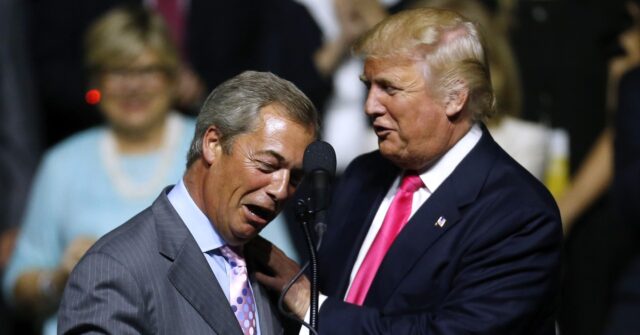Former President Donald J. Trump recently wrapped up his presidential campaign in Pennsylvania, highlighting his strong friendship with British politician Nigel Farage, a prominent figure in the Brexit movement. During a rally in Reading, Pennsylvania, Trump drew parallels between the populist movements in both the United States and the United Kingdom, positioning Farage’s efforts to extricate Britain from the European Union as akin to his own MAGA agenda. Trump noted that Farage, who he described as a respected and influential figure, has been instrumental in challenging the political establishment in the UK, much like Trump did in America during his 2016 campaign.
Trump lauded Farage’s accomplishments in UK politics, emphasizing their enduring friendship and mutual support, indicating that Farage’s victory in the last UK election further solidified his status as a prominent political player. Touting Farage’s significance in the Brexit campaign, he expressed admiration for Farage’s ability to invigorate the political landscape in the UK. The rally, echoed by the enthusiasm of Trump’s supporters, served to reinforce the connection between their respective political movements, illustrating a unified front against perceived establishment forces.
Farage, a notable ally of Trump, had previously backed his presidential bid in 2016; however, he faced a time constraint when a sudden UK election was called in July. Despite the short preparation timeframe, Farage’s Reform UK party garnered significant public support, securing over four million votes and a parliamentary seat in Clacton, representing a significant political comeback. This achievement illustrates his continued influence within British politics and his intention to maintain pressure on establishment parties leading up to the 2029 general elections, where he aims to challenge both the Conservative and Labour parties.
On his visit to Pennsylvania, Farage echoed Trump’s sentiments, observing a resurgence of support for Trump in the United States. Standing in Scranton, Farage noted the visible increase in Trump campaign signs compared to previous election cycles, indicating a shift in public sentiment. He characterized Trump as less of a “feared figure,” suggesting that his support base may have expanded since earlier campaigns. This perspective aligns with Trump’s strategy of rallying voter enthusiasm at a grassroots level, underscoring the dynamic political landscape as the election approaches.
In a broader context, the alliance between Trump and Farage signals a shared vision of populism that transcends national borders, fostering a collaborative approach among like-minded leaders. By celebrating their victories, the two figures have effectively created a narrative that emboldens their respective causes, promoting the idea that they are part of a larger movement resisting globalist influences. This partnership highlights the intertwining of political narratives, as both leaders strive for electoral success amid challenges facing traditional political structures.
As the final stages of Trump’s campaign unfold, the significance of his relationship with Farage becomes increasingly apparent in shaping voter perceptions. The rally in Pennsylvania not only served as a political platform for Trump but also as a manifestation of shared ideologies between American and British populism. With both leaders dedicating themselves to mobilizing their supporters, their continued collaboration emphasizes the importance of solidarity among populist movements in navigating the complexities of contemporary political discourse and preparing for future electoral contests.

